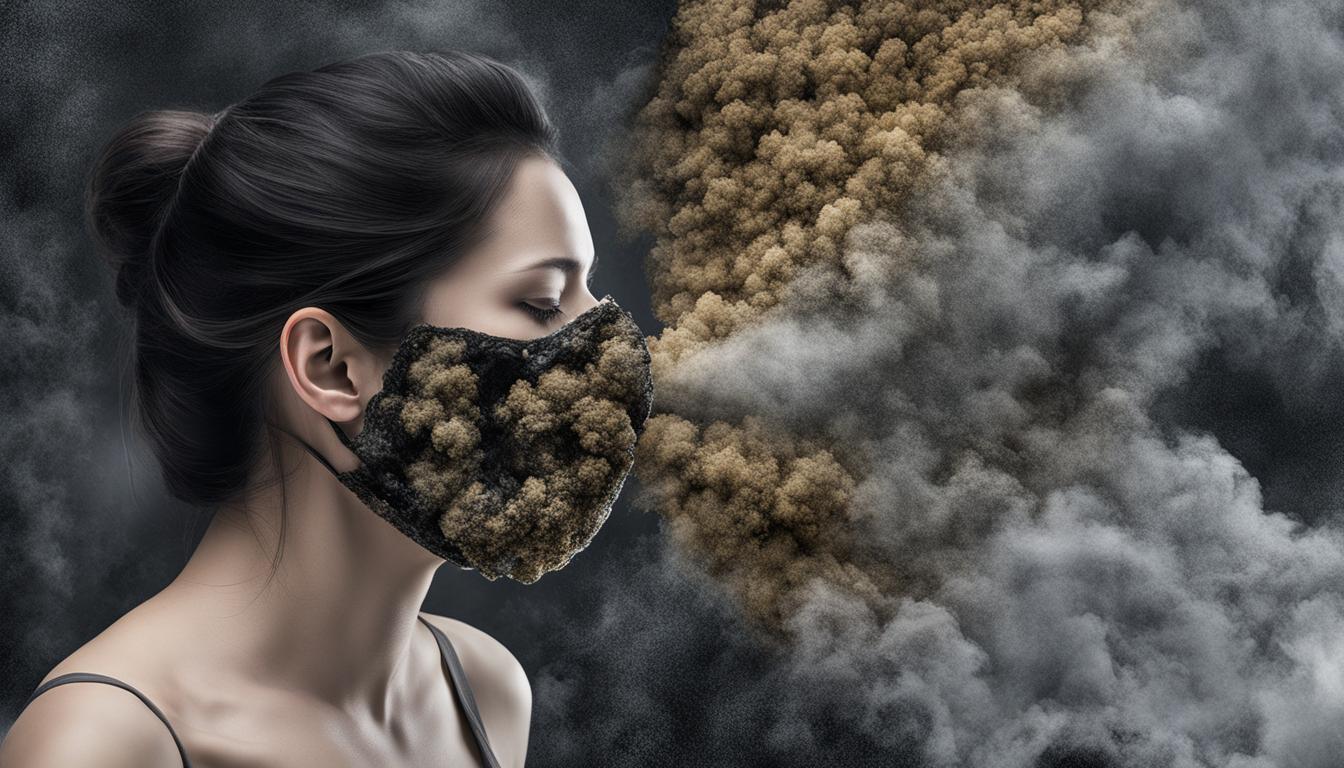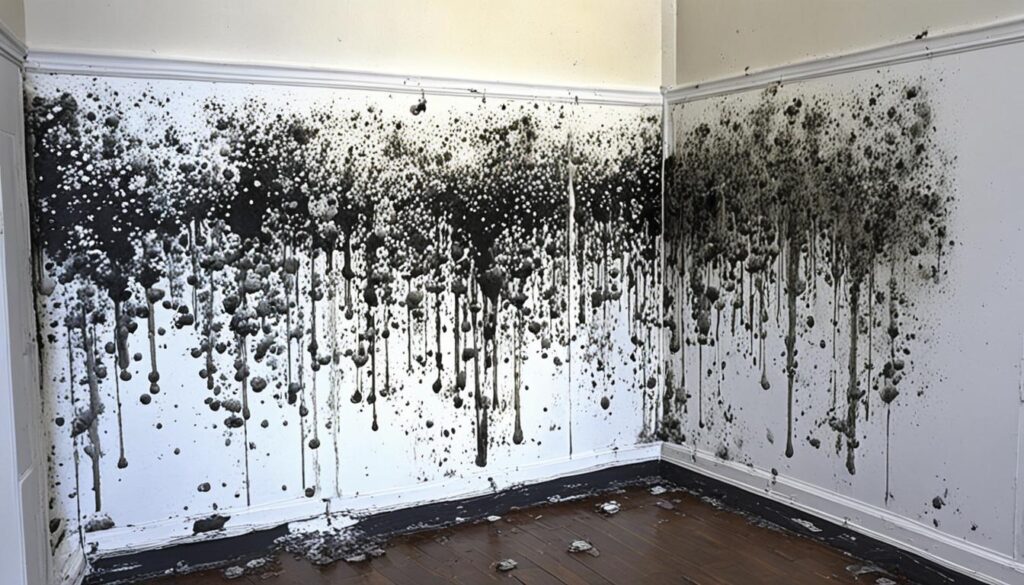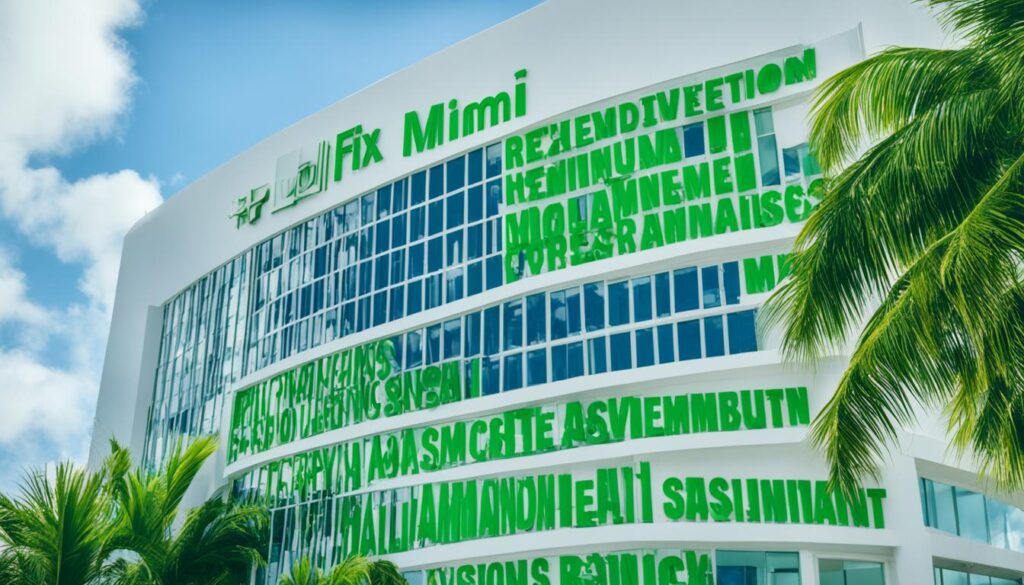
Understanding Black Mold Symptoms: A Guide
Black mold symptoms can be detrimental to both your health and the overall well-being of your home or workplace. It is crucial to recognize the signs of black mold exposure to take proactive measures in protecting yourself and those around you.
In this comprehensive guide, we will explore the various black mold symptoms, their health risks, and steps you can take to safeguard your health. By understanding the effects of black mold and learning how to identify its symptoms, you can mitigate the potentially harmful consequences.
Key Takeaways:
- Recognizing black mold symptoms is crucial for preventing health complications.
- Common black mold symptoms include respiratory issues, allergic reactions, and physical discomfort.
- Toxic black mold can have severe health risks, including neurological and respiratory problems.
- Protect your health by addressing mold infestations promptly and implementing preventive measures.
- Seeking professional help for black mold remediation ensures thorough and effective removal.
Identifying Black Mold Symptoms
When it comes to protecting your health from the harmful effects of black mold, early detection is key. By learning to identify the signs of black mold exposure, you can take swift action to mitigate the risks. Keep an eye out for the following black mold symptoms:
- Respiratory Issues: Persistent coughing, wheezing, and difficulty breathing may indicate black mold exposure. These symptoms are often exacerbated in individuals with pre-existing respiratory conditions.
- Allergic Reactions: Black mold can trigger allergic reactions in sensitive individuals. Symptoms may include sneezing, nasal congestion, itchy eyes, and skin irritation.
- Physical Symptoms: Individuals exposed to black mold may experience unexplained fatigue, headaches, dizziness, and frequent sinus infections.
It’s important to note that these symptoms may vary from person to person, and some individuals may not exhibit any noticeable signs of black mold exposure. If you suspect the presence of black mold in your environment, it is advisable to seek professional assistance for accurate identification and remediation.
“The health effects of black mold can be subtle and easily mistaken for other conditions. Recognizing the symptoms is crucial to protecting your well-being and that of your loved ones.” – Dr. Emily Wilson, Environmental Health Specialist
Regular inspections and prompt action can help prevent further exposure and potential health risks. If you notice any signs of black mold or experience unexplained health issues, do not hesitate to address the problem.
Next, we will explore the health risks associated with black mold and how it can adversely affect your overall well-being.
Health Risks of Black Mold
Black mold, also known as Stachybotrys chartarum, poses significant health risks to individuals who are exposed to it. Toxic black mold can have detrimental effects on the body, leading to various symptoms of black mold sickness. It is vital to understand these health risks and recognize the signs of black mold exposure to protect your well-being.
Exposure to toxic black mold can result in several adverse effects on the body. The mycotoxins released by black mold can lead to respiratory issues, allergic reactions, and other health problems.
Respiratory Issues
One of the most common health risks associated with black mold is respiratory issues. Prolonged exposure to black mold spores can trigger asthma attacks, cause chronic coughing, wheezing, and difficulty breathing. Individuals with existing respiratory conditions, such as asthma or allergies, are particularly vulnerable to these effects.
Allergic Reactions
Black mold exposure can also induce allergic reactions in susceptible individuals. Symptoms may include sneezing, itchy or watery eyes, nasal congestion, and skin rashes. These allergic responses can vary in severity depending on the individual’s sensitivity and the duration of exposure.
Other Health Problems
In addition to respiratory issues and allergic reactions, toxic black mold exposure has been associated with a range of other health problems. These may include fatigue, headaches, dizziness, nausea, and even neurological issues in some cases.
Identifying the symptoms of black mold sickness is crucial for timely intervention and mitigating further health complications. If you experience persistent respiratory problems or unexplained allergic reactions, it is essential to consider the possibility of black mold exposure.
Tip: If you suspect black mold infestation in your home or workplace, it’s advisable to consult a professional mold inspector to conduct a thorough assessment and determine appropriate remediation measures.
Understanding the health risks associated with black mold is vital for safeguarding your well-being and that of your family. By recognizing the symptoms of black mold sickness and taking prompt action, you can minimize the negative effects on your health. Prioritize prevention, early detection, and remediation to create a safe and healthy environment.

| Health Risks of Black Mold | Effects |
|---|---|
| Respiratory Issues | Increase the risk of asthma attacks, chronic coughing, wheezing, and difficulty breathing. |
| Allergic Reactions | Trigger sneezing, itchy or watery eyes, nasal congestion, and skin rashes. |
| Other Health Problems | Lead to fatigue, headaches, dizziness, nausea, and potential neurological issues. |
Protecting Your Health from Black Mold
Black mold can pose serious health risks if not properly addressed. To safeguard your well-being and minimize the risk of developing mold-related health issues, it’s crucial to take proactive measures. By implementing the following tips, you can protect yourself and your loved ones from the harmful effects of black mold.
1. Keep Moisture at Bay
To prevent black mold growth in your home or office, it’s essential to maintain proper moisture levels. Regularly check for leaks and repair any water damage immediately. Ensure adequate ventilation in areas prone to moisture, such as bathrooms, kitchens, and basements. Consider using dehumidifiers to control humidity levels, aiming for a range of 30-50%.
2. Monitor Indoor Humidity
Humidity levels that are too high create a favorable environment for black mold to thrive. Use a hygrometer to monitor indoor humidity levels regularly. If the readings exceed recommended levels, take steps to reduce humidity, such as using air conditioners, fans, or opening windows to improve air circulation.
3. Properly Ventilate Your Space
Proper ventilation plays a crucial role in preventing black mold growth. Ensure that bathrooms, kitchens, and laundry rooms are equipped with exhaust fans to remove excess moisture. Allow fresh air to circulate by opening windows whenever possible, especially after activities that generate moisture, such as showering or cooking.
4. Clean and Dry Water-Prone Areas
Frequently clean and dry water-prone areas to discourage mold growth. Pay close attention to areas around sinks, showers, and bathtubs. Use mold-resistant products when cleaning and promptly dry any wet surfaces, including towels and bath mats.
5. Use Mold-Resistant Materials
When renovating or remodeling, consider using mold-resistant materials. These materials are designed to resist moisture and inhibit mold growth, such as mold-resistant drywall, paints, and insulation. Consulting with professionals in the field can help guide you in selecting the most appropriate materials for your specific needs.
Implementing these preventive measures can significantly reduce the risk of black mold growth and associated health issues. However, if you suspect black mold contamination or experience persistent symptoms related to mold exposure, it’s important to seek professional assistance for a thorough assessment and remediation of your environment.
| Protective Measures | Benefits |
|---|---|
| Regularly check for leaks and repair water damage | Prevent moisture accumulation and halt mold growth |
| Maintain proper indoor humidity levels | Discourage mold growth and improve air quality |
| Ensure adequate ventilation | Promote air circulation and reduce moisture buildup |
| Clean and dry water-prone areas | Limit mold-friendly environments and inhibit growth |
| Use mold-resistant materials | Prevent mold colonization and prolong durability |
Remember, being proactive in protecting your health from black mold is essential. By implementing these practical tips, you can create a safer living environment and reduce the risk of respiratory issues and mold poisoning symptoms associated with black mold exposure.
Seeking Professional Help for Black Mold Remediation
When it comes to dealing with black mold in your environment, seeking professional help for remediation is crucial. Trying to handle black mold on your own can be risky and ineffective, as it requires specialized knowledge and equipment to ensure thorough removal.
One of the signs that indicate the need for professional assistance is experiencing black mold symptoms. These symptoms can vary from person to person but commonly include respiratory issues, allergic reactions, and other physical symptoms. It’s important not to ignore these signs, as black mold exposure can have serious health implications.
By hiring experts in black mold remediation, you ensure that the problem is handled safely and effectively. Professionals have the necessary training and experience to identify the extent of the mold growth, locate the source of moisture, and devise a comprehensive plan to eradicate the mold.
Mold spore allergies are another concern when dealing with black mold. An allergy to mold spores can cause respiratory problems, such as coughing, wheezing, and difficulty breathing. If you suspect mold spore allergies, it is essential to seek professional help to eliminate the mold and prevent further exposure.
“Black mold can be a serious threat to your health. It’s essential to seek professional help for remediation to ensure a safe and thorough removal of the mold. Attempting to handle it on your own may worsen the problem or lead to incomplete removal, putting your health at risk.”
Professional mold remediation services have the expertise to handle the situation efficiently. They use advanced techniques and equipment, such as air filtration systems and antimicrobial treatments, to remove the mold and prevent it from returning.
Remember, the health and safety of you and your loved ones should always be the top priority. Don’t hesitate to reach out to professionals when dealing with black mold in your environment. Their expertise and knowledge will ensure that the remediation process is thorough and effective, providing you with peace of mind.
Next, let’s take a closer look at Fix Mold Miami, Florida’s leading mold assessment, prevention, and remediation service.
Fix Mold Miami: Florida’s Leading Mold Assessment, Prevention, and Remediation Service
When it comes to ensuring the safety of your home or business from the harmful effects of black mold, Fix Mold Miami is Florida’s top choice. With our expert mold assessment, prevention, and remediation services, we are dedicated to providing comprehensive solutions for all your mold-related concerns.
At Fix Mold Miami, we understand the importance of swift action when it comes to black mold. Our team of trained professionals is equipped with the knowledge and expertise to identify and address the presence of black mold effectively.
Whether you are experiencing black mold symptoms or want to take preventative measures, our services cover a wide range of needs. From thorough mold inspections to mold prevention strategies, we aim to create a safe and mold-free environment for you and your loved ones.
With our state-of-the-art equipment and advanced techniques, we ensure that every step of the mold assessment, prevention, and remediation process is carried out with precision and effectiveness.
To experience the exceptional mold services offered by Fix Mold Miami, contact us today at 305-465-6653. Your satisfaction and safety are our top priorities, and we are committed to providing outstanding service to our valued customers.

Don’t let black mold compromise your health and well-being. Trust Fix Mold Miami, the leading mold assessment, prevention, and remediation service in Florida, to restore the safety of your home or business.
Conclusion
In conclusion, understanding black mold symptoms is crucial for safeguarding your health and well-being. By familiarizing yourself with the signs of black mold exposure and taking appropriate measures, you can significantly reduce the risks associated with black mold.
Identifying the symptoms of black mold, such as respiratory issues, allergic reactions, and other physical manifestations, is the first step in protecting yourself. Prompt action is essential to prevent further health complications and minimize the impact on your daily life.
If you suspect black mold in your environment, it is recommended to seek professional help for assessment, prevention, and remediation services. Fix Mold Miami, a trusted and reputable provider, offers comprehensive solutions to address black mold concerns in Florida. Contact Fix Mold Miami at 305-465-6653 to ensure a safe and healthy living or working space.
FAQ
What are the common black mold symptoms?
Common black mold symptoms include respiratory issues, such as coughing, wheezing, and shortness of breath, as well as allergic reactions, such as sneezing, itching, and watery eyes. Other symptoms may include fatigue, headaches, and skin rashes.
How can I identify black mold symptoms?
To identify black mold symptoms, look out for the signs of respiratory issues, allergies, and other physical symptoms mentioned earlier. Additionally, pay attention to the environment around you. Black mold typically appears as black or dark green patches on walls, ceilings, and other damp areas.
What are the health risks associated with black mold?
Black mold can have various health risks, including respiratory issues, allergic reactions, and potential long-term effects on immune system function. Prolonged exposure to toxic black mold can lead to more severe health problems, especially in individuals with weakened immune systems.
How can I protect my health from black mold?
To protect your health from black mold, it is essential to address any moisture issues in your home or workplace promptly. Keep the environment clean and dry, repair any water leaks, and ensure proper ventilation. If you suspect black mold, consult a professional for assessment and remediation.
When should I seek professional help for black mold remediation?
It is advisable to seek professional help for black mold remediation if you have detected signs of mold spore allergies or suspect the presence of black mold. Professional mold assessment and remediation services, like Fix Mold Miami, can effectively remove black mold and ensure a safe environment.




